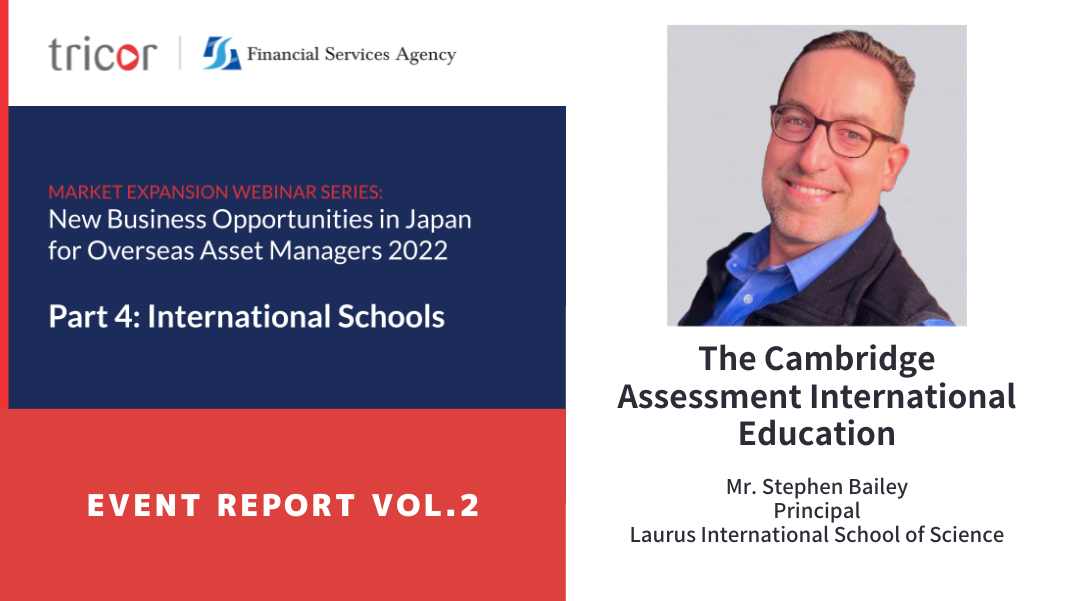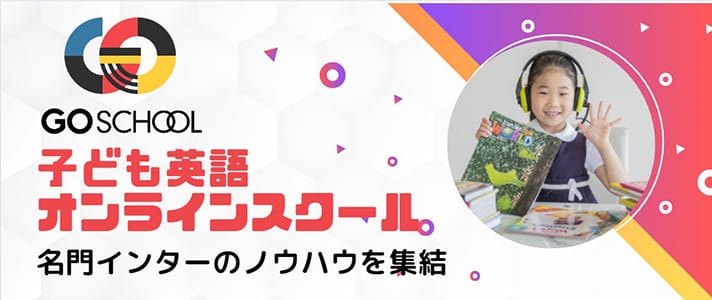What is the appeal of the Cambridge International Curriculum
Sponsored by FSA and Tricor! The Latest on International schools & Boarding schools
-Event report on a popular international educational event
On Thursday, November 10 and Thursday, November 17, “International schools and Boarding schools Online Seminar” (sponsored by FSA and Tricor) was held. Approximately 570 participants (total for the two days), mainly foreign investors who are considering stationing in Japan and domestic and foreign families interested in international education, listened attentively to the appeal and latest situation of international schools and boarding schools in Japan.
The editorial team will provide a three-part report on the seminar with presentation from the speakers.
In this second article, we bring you a presentation by Mr. Stephen Bailey, Principal of Laurus International School of Science, on “The Appeal of the Cambridge International Curriculum.”
 Mr. Stephen Bailey
Mr. Stephen Bailey
Principal, Laurus International School of Science
Mr. Bailey comes from a family of teachers and was educated in Canada, the United Kingdom, and The Republic of Ireland. He has a passion for education, business, and science and took those passions to Laurus International School of Science in Tokyo where he has been both a teacher, curriculum coordinator and recently the Principal, over the past two years.
Apart from his position at Laurus, Mr. Bailey owns several companies that operate around the world. This business acumen serves his position at Laurus by bringing real-world business experience to the classroom. Mr. Bailey upholds the Laurus mission statement of “creating innovators to change the world for the better.” Creating these innovators and entrepreneurs is what drives us to do our best every day.
Curriculum that helps students acquire the thinking skills necessary to become global citizens
-What is the Cambridge International Curriculum?
Cambridge Assessment International Education (“Cambridge International”) is an educational institution under the University of Cambridge, UK. It is known as an international education provider offering qualifications for 5-19 year olds, an international education program that is as popular as the International Baccalaureate in the world.
Cambridge International offers primary and secondary education programs, along with IGCSE and A-levels, designed to help students develop the high-level thinking skills necessary to live as global citizens, including problem solving, critical thinking, independent research, collaboration, discussion and presentation. The program is designed to help students develop the high-level thinking skills necessary to live as global citizens.
International schools that adopt the Cambridge International Curriculum are accredited if they offer one of the following educational programs designed to help students develop the higher-level thinking skills necessary to live as global citizens: problem solving, critical thinking, independent research, collaboration, and discussion and presentation. If any of these are offered, the program is accredited.
Collaboration is an important part of the Cambridge curriculum, and we incorporate many of the PSHE (Personal, Social and Health Education) policies and expect our students to work together. So social skills are a big part of what we do. Presentation skills come up every day. We want kids to lead their classes and schools and organize student councils with their students. We want them to lead the school with the students through student councils and other activities.
Determine your strengths and entrance requirements, and apply to universities with 3 or 4 specialized courses.
-Four areas of study, divided by age.
The Cambridge system is divided into these four main areas.
| Program | Age | Detail |
|---|---|---|
| Primary (Cambridge Primary) | 5-11 | There are a variety of subjects, including English, math, science, ICT, a class called “Global Perspectives” and art. Each school offers any combination of subjects. At the end of the program, there is a final evaluation test called Checkpoint, which provides feedback on how students have mastered the program, including strengths and weaknesses. |
| Lower Secondary (Cambridge Lower Secondary) | 11-14 | Three-year program. Students study each subject in continuity with the elementary content of the Cambridge International Curriculum. In middle school, there is also a Checkpoint test. English, mathematics, and science are graded by Cambridge International, and the “Global Perspectives” research report is graded by the school faculty and double-checked by Cambridge International |
| Upper Secondary (Cambridge Upper Secondary) IGCSE | 14-16 | The first semester of upper secondary school will offer a two-year program of IGCSE.IGCSE is the most well-known curriculum in the world in the field of secondary education. It is the most popular international qualification in the world. Students study 5-8 subjects in this process. IGCSE assessment scores are internationally recognized, with some scores also submitted when applying to universities. |
| Upper Secondary (Cambridge Advanced) AS & A Level | 16-19 | In the second semester of upper secondary school, there is a one-year program, AS Level (Advanced Subsidiary), and a two-year program, A Level. Students have the option of taking AS (also known as “A1”) for one year, A Level (A2) in the second year, or A Level after two years of study. A Level subjects are selected based on strengths and the degree of need for university application. There are no compulsory subjects at AS / A Level, and students take about 4 AS Level subjects and 3 A Level subjects. Examinations are held twice a year, in June and November. Evaluation results are given in August and January, respectively. To be admitted to top universities, students must obtain grades A*-A. |
Flexibility in curriculum is the charm of Cambridge International.
-Advantages of choosing Cambridge A Levels
Cambridge International A-level subjects are good for about 3-4 subjects. Students focus on the subjects that interest them or that are required by the faculty they want to go to, and study more specialized subjects for two years.
– Deep subject content
– Learning to be an individual learner
– Applying knowledge and understanding in new and everyday situations
– Handling and evaluating diverse sources of information
– Logical thinking and reasoned, coherent argumentation and explanation
At Cambridge International, students must choose courses in which they are interested and whose credits are accepted as grades by the university they wish to apply to. The final course of study is very specialized and in-depth, with connections to specialized areas of study at the university.
If, in the course of study, there are areas in which the student loses interest or wants to change direction, these can be eliminated. The ability to change direction during the higher education phase before deciding on a specific department is also an attractive feature.
-The appeal of Cambridge International
In the case of the Cambridge International Curriculum, the curriculum is simply a framework, so students can combine the Cambridge International Curriculum with other international curricula or the school’s own curriculum.
This curriculum is recommended for students who want an edgy, cutting-edge education while utilizing the solid Cambridge International Curriculum system.
Writer: Kaori Takahashi




